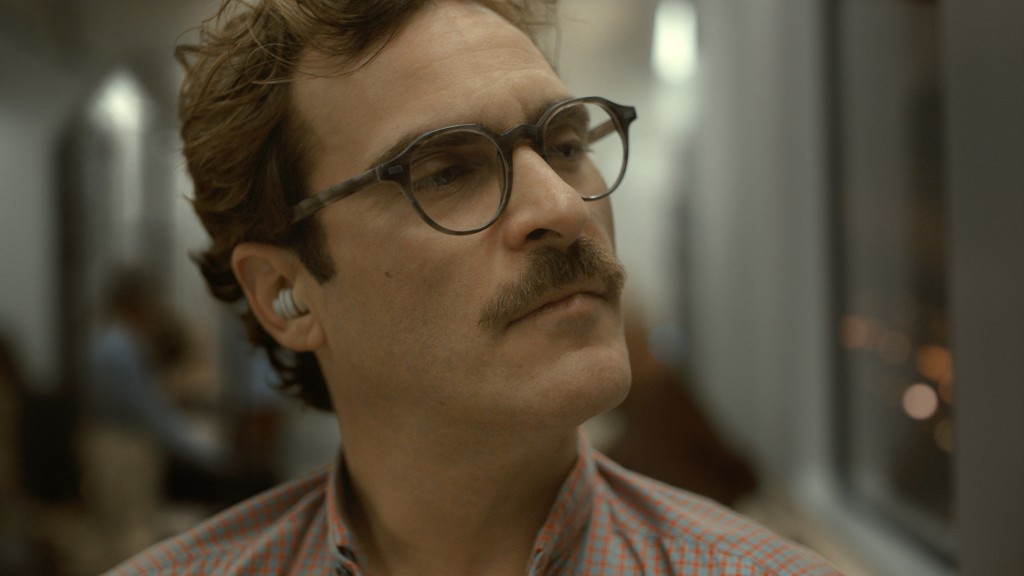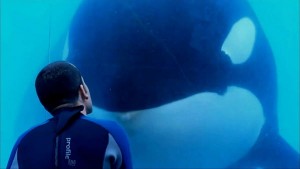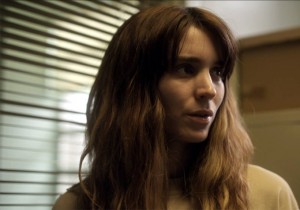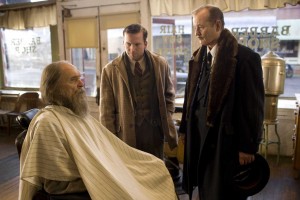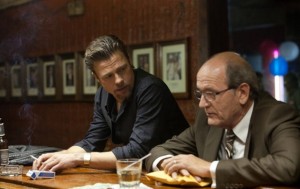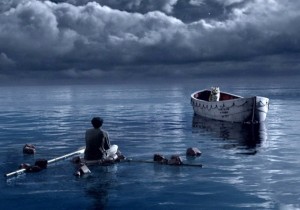It’s … really complicated.
Dir. Spike Jonze
As if relationships weren’t complicated enough, 21st century communications technology inevitably compounds the problem. We’re still quite early in the century, lest we forget, and Hollywood boldly goes “where no man has gone before” – so to speak. Her, the engaging, very funny, and genuinely fascinating combination of science fiction and romantic comedy – sci-fi rom-com? – from director Spike Jonze, set in the not-too-distant future, imagines just where we may be headed, and sooner than we think.
Her pushes hard on the idea of artificial intelligence and the implications for human relationships (see Apple’s “Siri” commercials for a hint of where things may be going, which may even have inspired the movie). Theodore Twombly, the marvelously named wimpy main character, played with almost unbearable sensitivity by Joaquin Phoenix, works in the imitation reality business, ghost-writing apparently heartfelt personal letters for the clients of a website called BeautifulHandwrittenLetters.com. Theodore rebounds from the breakup of his marriage by getting into a relationship with a new update of his computer’s operating system.
Thanks to big advances in artificial intelligence, the new OS is a very human-sounding entity capable of intuition, learning, and apparently real emotion. No longer confined to a single platform like a desktop, the OS, or at least its personality, moves freely across Theodore’s various technology, including his snazzy handheld, virtually anticipating his every need. During the setup he chooses a female identity for the OS (there’s only two choices, apparently). She names herself Samantha, and converses with him, Siri-like, in the easy, intimate voice of Scarlett Johansen, a comforting presence injected seamlessly into Theodore’s lonely psychic landscape via his perfect, and perfectly comfortable, earbud. In short order, they’re sleeping together.
More than just a rom-com, Her explores the familiar sci-fi territory of the human-machine relationship. The fascination with robots in literature, television, and film is longstanding, and the uneasy relationship is mainly a rich and useful metaphor for the deep-seated American anxiety over slavery. At issue, across nearly all robot stories from the earliest through the entire Star Trek series, Blade Runner, and into Terminator films and the like, is always the question of how we define human. That, and the more dramatic problem of what happens when the slaves try and take over. Robot films, in particular, continuously probe the difference between human and non-human, and the question of what it is that makes one, or something, fully human? Who, or what kind of creatures, gets that status, and why? And who gets to decide? It’s a matter fraught with social, legal, and in sci-fi, technological dimensions.
Not exactly a robot film, though, the more direct genesis of Her is in Andrew Niccol’s 2002 film S1m0ne, or Simone, which explored the implications of rapidly advancing video editing technology. In that moderate hit film, Al Pacino plays a movie producer struggling to complete a comeback film, sick of dealing with temperamental starlets. He turns to advanced computer technology and creates a virtual actress, Simone, “the perfect woman,” who he edits into his film and then sells to the world as if she were real.
Thanks to real, or realistic, developments in computer and communication technology, in Her the non-human being in question is again virtual, the essence of an intelligence, no longer confined to a body either mechanical, synthetic, cyborg, or hybrid. This is something of a change of subject for the genre, with the best early example I can think of being 2001, A Space Odyssey. “Hal, open the pod doors!!!”
It’s this change that sets up the rom-com opportunity; much of the film digs into the question of just what kind of relationship is it, and what does it mean, when the other doesn’t have a body at all. Some of the funniest scenes happen as the human-OS relationship becomes normalized in the culture, and Theodore and Samantha start going on double-dates, vacations, and the like. Samantha sees the world through the camera on Theodore’s handheld, a continuous presence peeking out of his pocket, presumably conversing with others through some kind of speakerphone. At about the same point in the film, however, the camera suggests to us that the OS/human relationship phenomenon is spreading, possibly in an unhealthy way. In several shots we see people in the background going about their business, greater and greater numbers of them solo but clearly conversing and interacting with – who? With someone not there, obviously, which today would mean they’re either deranged or talking on their cell phones. But in the context of this film, we suspect that more and more of them, like Theodore, have become involved with their OS’s.
Jonze, whose previous credits include the brilliant, quirky, ontological comedy Being John Malkovitch (1999), also wrote the screenplay, and based on the script alone, he deserves whatever awards he gets for the film. It’s as pitch-perfect as Theodore’s earbud. Jonze captures – flat-out nails – the drama and nuance of modern relationships, compounded here with futuristic twists and turns, with precision and a sharp comic sensibility. At one point, the green-eyed monster intrudes on the lovers when Samantha, who has already joined a book club, is MIA briefly and turns out to have been hanging out with a bunch of other OS’s in California, dialoguing suspiciously with the 1960s philosopher and self-help author Alan Watts (Brian Cox), a virtual being reconstructed by the OS’s from historical archives.
Technology aside, one of the earthier themes of the movie is the problem, and the opportunity, of growth and change in human relationships. Like a great many films, this one opens with a broken relationship and a missing partner. Theodore and his wife, Catherine (Rooney Mara), essentially grew up together, and then, as humans sometimes do, grew apart. The film repeatedly articulates, and dramatizes through Theodore’s relationship with his OS, the understandable possibility that there’s simply something wrong with him, that in some fundamental way he’s become unable to have a real relationship with a real human. And what does that mean, “real,” anyway?
As the new relationship develops and plays out, over the course of the film, Theodore gradually does the real work of the film, comes to terms with the failure of his marriage, faces and resolves his grief. And as with his marriage, in the end Theodore and Samantha also outgrow each other. It is in no way a cop-out that the film sets aside the fascinating questions it raises, and resolves its issues by re-framing this unusual and troubling connection, ultimately, as the perfect transitional relationship.
Showing now at theaters in the greater Rochester area.
